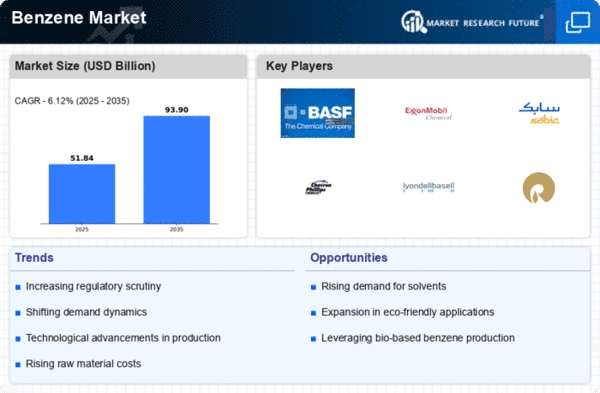Top Industry Leaders in the Benzene Market

Benzene, a colorless, flammable liquid with a sweet odor, is a fundamental building block in numerous industries. From plastics and pharmaceuticals to detergents and dyes, its versatility and diverse applications make it a vital commodity in the global economy. However, the benzene market is far from a harmonious blend, with intense competition, evolving regulations, and environmental concerns shaping the landscape. This comprehensive analysis delves into the strategies, factors, and recent developments defining this dynamic market.
Strategies for Claiming a Larger Slice of the Benzene Pie:
-
Technological Innovation: Companies like ExxonMobil and Shell are investing in cleaner production technologies like catalytic dehydrogenation, aiming to reduce emissions and improve environmental compliance. -
Vertical Integration: Expanding beyond benzene production into downstream industries like styrene and phenol creation offers greater control over the supply chain and maximizes profits. -
Diversification into Specialty Benzenes: Developing high-purity grades and specialized benzene derivatives caters to specific applications in electronics, pharmaceuticals, and other niche markets. -
Strategic Partnerships and Collaborations: Joining forces with research institutions, waste management companies, and renewable energy providers fosters innovation, unlocks new resources, and builds sustainable partnerships.
Factors Shaping Market Share Distribution:
-
Production Capacity and Efficiency: Companies with larger and more efficient facilities have a cost advantage and can cater to large-volume orders, attracting major manufacturers. -
Geographical Presence: Access to abundant and affordable crude oil reserves, coupled with strong regional demand, gives companies like Sinopec and PetroChina an edge in Asia. -
Regulatory Compliance: Stringent environmental regulations in Europe and North America favor companies with cleaner production processes and waste management solutions. -
Product Quality and Consistency: Consistent production of high-quality benzene with precise specifications is crucial for maintaining customer trust and securing long-term contracts.
Key Players:
- Aerosol Aromatics GmbH & Co. KG (Germany)
- Dow (US)
- SABIC (Saudi Arabia)
- Borealis AG (Austria)
- BP plc (UK)
- Exxon Mobil Corporation (US)
- BASF SE (Germany)
- Repsol (Spain)
- Royal Dutch Shell Plc (Netherlands)
- China Petroleum & Chemical Corporation (China), among others
Recent Developments:
July 2023: The European Union proposes stricter regulations on benzene emissions from industrial processes, prompting companies to invest in cleaner technologies.
August 2023: The Indian government announces a subsidy program for adopting cleaner benzene production technologies, boosting the market for sustainable solutions.
September 2023: A research collaboration between universities and industry players makes significant progress in developing a commercially viable bio-based benzene production process.
November 2023: The global benzene market experiences a slight decline in demand due to economic slowdown in major consumer markets, particularly in construction and automotive sectors.










